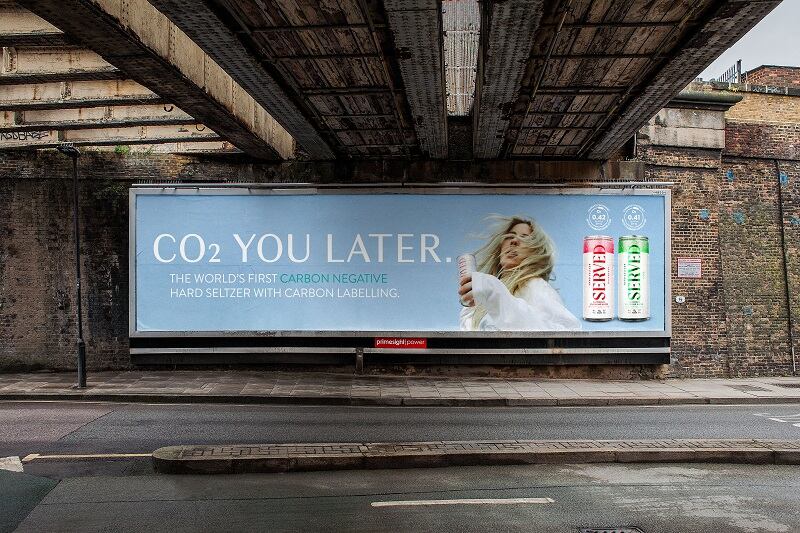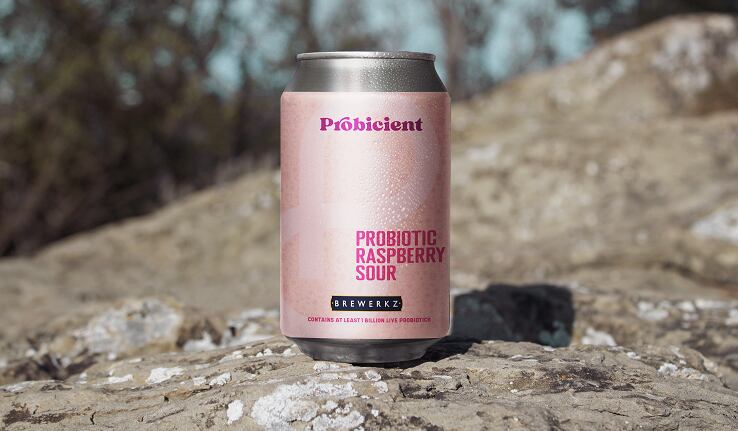SERVED has partnered with CarbonCloud to automate the Life Cycle Assessment process and analyse the climate footprints at all stages from ‘grower-to-grocer’, which covers the production of agricultural inputs, transport, processing, packaging, and distribution up until the product reaches the shelf of the grocery store.
The new label displays the carbon dioxide equivalents (CO2e), a value which converts the varying effects of different gasses into the equivalent amount of CO2 it would take to create the same greenhouse effect. A universal CO2e measurement allows different products and activities to be compared to each other on a level playing field - whether that be a piece of clothing, a food product or even a car journey.
SERVED’s lime and raspberry hard seltzers have a footprint of 0.41kg and 0.42kg CO2e per kg of product respectively.
The element with the most significant climate impact of SERVED’s production process is its packaging.
“Sourcing the right packaging materials has therefore been an absolute priority. We assess both the carbon footprint of packaging materials and their level of recyclability,” explained SERVED’s co-founder Dean Ginsberg. “We use aluminium cans that are manufactured in the UK, because they are produced using high levels of recycled aluminium and are infinitely recyclable themselves, which is vital to create a circular economy.”
Aluminium recycling is rapidly improving in the UK, the company claimed with a record 82% of all aluminium beverage cans recycled in 2020, its highest ever rate.
Saving ‘wonky’ fruit
Although emissions associated with SERVED’s raw ingredients are less significant, they are given just as much attention.
Its drinks are infused with ‘wonky fruit’ that would have otherwise gone to waste for aesthetic reasons alone. It has been estimated that as much as 50 million tonnes of fruit and vegetables is thrown away in Europe each year because it does not meet aesthetic standards of retailers. By upcycling fruit that is bent, bashed, and bruised, the company says it is able to reduce food waste and save tonnes of perfectly good fruit from becoming food waste and contributing to emissions.
SERVED also invests in offsetting projects that are certified by Gold Standard, many of which reduce emissions ‘at the source of the impact’.
Ginsberg explained: “For example, we source our limes from Brazil and fund the Brazilian Amazon REDD project to offset emissions from planned deforestation on a property in Para State, preserving 27,434.9 hectares of native forest, which had previously been designated for deforestation.
“Our offsetting programme ensures that we offset more than we emit, making SERVED a carbon negative business and the world’s first carbon negative hard seltzer.
“We are extremely proud to have offset more than 50 tonnes CO2e and planted over 1,600 trees in the last 12-months, which is significantly greater than our business carbon footprint of 1.18 tC02e.”
With food production estimated to contribute around a third of total GHC emissions, the industry represents one of the greatest opportunities for us as individuals to fight climate change, said Ginsberg.
“Independently certified carbon labelling provides much needed environmental transparency – it allows consumers, who are increasingly looking for more sustainable choices, to make informed decisions on the products they consume. We hope this will help drive improvement across the food industry and encourage healthy competition to ‘race to the bottom’ in terms of emissions.”
“The real power in calculating and understanding your climate footprint at every stage of your production process is that it allows you to find hotspots, build future scenarios and focus on making incremental improvements over time.”



